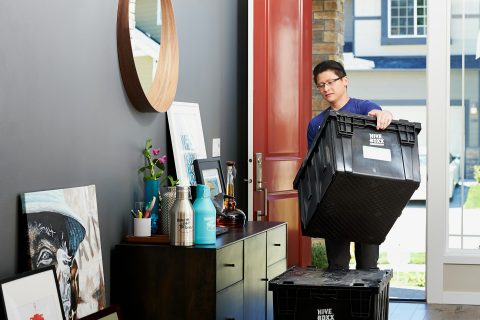
Renting an apartment for the first time or even the fifth can feel a little overwhelming. With so many things to consider, from setting a budget to signing a lease, it’s easy to miss necessary steps.
Whether you’re moving out alone, relocating for work or school, or just ready for a change, we’ll walk you through everything you need to know. From finding the right place to preparing your documents and planning your move, we’ll ensure you feel confident every step.
Let’s get started on finding your next home!
Jump to Section [Hide]
- Assess Your Financial Situation
- Check and Improve Your Credit Score
- Decide on Renting Solo or with a Roommate
- Identify Your Preferred Location
- Clarify Your Apartment Needs and Preferences
- Start Your Apartment Search
- Evaluate Apartments Thoroughly
- Prepare Essential Documents
- Complete and Submit Your Rental Application
- Carefully Review Your Lease Agreement
- Finalize Your Apartment
- Organize and Plan Your Move
- Settle into Your New Apartment
1. Assess Your Financial Situation
Make sure your monthly income can comfortably cover rent and other costs. Plan to avoid surprises like hidden fees or moving expenses.
Calculate how much rent you can afford
Your rent should not be more than 30% of your monthly income. For example, earning $65,000 a year can afford around $1,625 per month. Use your net income, the amount after taxes and deductions.
Factor in how much money you need for other bills, too. This includes utilities like water and electricity, plus groceries and transportation costs. Set aside some monthly funds for savings or emergencies just in case something unexpected happens.
Consider utilities, deposits, and other hidden fees
Budget for utilities, like water, electricity, and gas. These can cost around $200 monthly or about 7% of your yearly income. Check if internet, trash service, and cable are included in the rent or charged separately.
Plan for the security deposit, too. It often equals one to two months’ rent but averages around $500. When applying, look out for application fees; these are common added costs.
Don’t forget renters’ insurance, which adds a small monthly expense but protects your belongings.
Plan for moving costs and emergency funds
Save three times your monthly rent before starting your apartment search. For example, if rent is $1,000, aim to save $3,000. This covers deposits and the first month’s rent.
Add 10-15% to current bills for unexpected costs. Moving expenses like truck rentals or movers can add up fast. Set aside emergency funds in case of delays or repairs later on. Stay prepared!
2. Check and Improve Your Credit Score
Your credit score can impact whether landlords approve your application. Work on boosting it to improve your chances of renting the apartment you want.
Importance of your credit score in renting
Landlords use credit scores to decide if you are reliable. A low score might lead to a denial or require a higher security deposit. Many landlords look for scores of 650 or better before approving an application.
If your credit is weak, renting can become harder.
A good score shows you pay your bills on time. It builds trust with property management or landlords during the rental application process. They also check your credit history and debt level to ensure you can afford monthly rent payments without problems.
Steps to enhance your credit rating
You can check your credit report for free at annualcreditreport.com. Look for errors, such as incorrect information or outdated accounts, and dispute them immediately.
Pay bills on time, even if it’s just the minimum payment on a credit card. Keep your credit card balances low compared to their limits. Avoid opening too many new accounts quickly; this can temporarily lower your score.
Options if you have poor credit or no credit history
Consider a cosigner if your credit is bad or you have no credit history. A family member or close friend can help with your application. This shows the landlord that someone else will pay if you cannot.
With poor credit, expect to pay higher security deposits. Some landlords might also accept prepayment of several months’ rent upfront. Look for apartments that don’t require strict credit checks, like some smaller landlords or private owners.
When to consider a cosigner or guarantor
Bad credit or no credit history can make renting hard. Landlords may hesitate to approve your rental application. A cosigner, like a family member, can help in this case. They promise to pay the rent if you don’t.
Another option is a guarantor. This person also agrees to cover your rent if needed. Both options give landlords extra security and increase their chances of approval. Make sure the cosigner or guarantor fully understands their role before agreeing!
3. Decide on Renting Solo or with a Roommate
Living alone gives you complete control of your space, but it can get expensive. Sharing with a roommate cuts costs and adds company. Choose what fits your lifestyle!
Advantages and disadvantages of living alone
Living alone gives you freedom and privacy. You can set the apartment exactly how you like it, without any compromise. No need to worry about someone else’s mess or habits. Quiet evenings become your own time to relax or work in peace.
It’s also a great chance to learn independence.
But it’s not cheap. Rent is higher because no one can split the cost with you, including utilities and pet fees. Emergencies might feel tougher without anyone around for help.
Loneliness can also occur, especially during holidays or stressful times. Before deciding, it’s important to balance costs with comfort!
Pros and cons of having a roommate
A roommate can save you money. You split rent, utilities, and other costs like internet or groceries. Sharing expenses makes renting cheaper. It also means you’ll have someone around to help with chores and company when you want it.
But living with a roommate has challenges, too. They might not clean up as much as you’d like or pay bills on time. Differences in schedules, smoking habits, pets, or noise levels can cause problems.
Always talk about expectations before moving in together to avoid surprises later!
How to find a trustworthy roommate
Talk to possible roommates about habits and preferences. Ask about smoking, pets, cleaning routines, work schedules, and noise levels. Make sure they handle bills on time. Discuss sharing costs for groceries or other expenses.
Write a roommate agreement to avoid problems later. Include details like how rent will be split, house rules, and guest policies. This helps set clear expectations early on and keeps things organized.
4. Identify Your Preferred Location
Think about where you spend most of your time at work, school, or on hobbies. A good spot can save you money and make daily life easier.
Proximity to work, school, and essential services
Living close to work or school saves time and money. Long commutes can drain energy and cost more in gas or public transport fees. A nearby home means less stress and fewer transportation expenses.
Access to essential services like grocery stores, clinics, and banks is vital, too. For ease, these spots should be a short drive or walk away. Being near restaurants, theaters, or attractions makes social outings convenient without extra travel costs.
Evaluating neighborhood safety and crime rates
Check local crime stats before renting. Use websites like NeighborhoodScout or check police reports to see crime rates. Look for areas with low cases of theft, vandalism, and violent crimes.
Visit the area at different times of day and night. Talk to current tenants or neighbors about safety concerns. Ask landlords about security features like gates or patrols in the apartment complex.
Importance of local amenities (parks, groceries, etc.)
Living near parks and groceries makes life easier. Parks give you fresh air, space to walk, and options for outdoor fun. Groceries close by save time and money on travel.
Public transportation nearby can also cut your commuting costs. Access to theaters or restaurants adds more entertainment choices without long drives.
5. Clarify Your Apartment Needs and Preferences
Think about what makes an apartment a good fit for you then focus on the must-haves and deal-breakers before you start searching.
Essential apartment features (size, layout, appliances)
Focus on what you need most. A good apartment size depends on your lifestyle. If you’re living alone, a studio apartment might work well. For privacy or more space, choose one with multiple rooms.
Check the layout carefully. Open floor plans make small spaces feel bigger. Look for functional kitchens and enough storage options. Make sure appliances suit your needs, too. Key ones like stoves, fridges, and washers save time and money compared to using laundromats or eating out often!
Pet policies and fees
Check the pet policy before signing a lease agreement. Many landlords allow pets but charge extra for them. You may need to pay an average pet deposit of $287. Some also ask for monthly pet rent.
Read all fees carefully in the rental agreement. The landlord may limit certain breeds or sizes of pets. Contact them if you have questions about rules or costs. This will help avoid surprise charges later on!
Parking availability and costs
Parking can affect your rental budget. Some apartments include parking in the rent, while others charge extra. Monthly fees usually range from $15 to $25. Check if a separate deposit is needed for parking spots.
Ask about reserved spaces and guest parking options. This helps avoid surprises later. Always confirm these details with the landlord before signing any lease agreements.
Amenities like gym, pool, laundry facilities
Some apartments include handy amenities like on-site gyms or pools. These extras can save time and money on gym memberships or swimming elsewhere.
Many buildings offer laundry facilities, either shared or with washer/dryer hookups in units. On-site setups save trips to laundromats and add convenience to daily life.
6. Start Your Apartment Search
Begin your hunt with online tools and local resources. Explore options that match your budget and preferences.
Best websites and rental apps to use
Zillow is a popular site for apartment hunting. You can filter by rent, pet policy, and location to match your needs. Apartments.com also provides detailed listings with photos, maps, and tenant reviews.
Try rental apps like Zumper or HotPads for quick searches. They send alerts when new rentals pop up. Social media groups or community boards often share local options, too. This helps you find deals faster than big platforms sometimes do!
Utilizing social media and local community boards
Use social media to find apartments faster. Platforms like Facebook often have local rental groups. These groups show listings with rent, amenities, and lease terms details. You can also message landlords or renters directly for quick answers.
Check local community boards online or in person. Websites like Nextdoor help you explore neighborhood insights, such as safety and tenant reviews. Boards also offer roommate matches, allowing you to lower costs while renting your first apartment!
Scheduling visits and attending open houses effectively
Limit your visits to five apartments at a time. Too many can lead to confusion and missed details. Take photos of each place, and write notes about features like apartment amenities, layout, or any damages you notice.
If possible, plan your visits during daylight hours. This will help you spot issues like poor lighting or wear and tear more easily. Arrive on time for open houses and prepare questions about the lease or rental agreement, parking costs, or landlord-tenant laws.
7. Evaluate Apartments Thoroughly
Look closely at every apartment you visit, small details can reveal big problems, so pay attention!
Questions to ask during apartment tours
Ask about safety measures like locks, lighting, and security cameras. Check the tenant demographics to see if the building suits your lifestyle.
Find out how maintenance requests are handled and how quickly issues get fixed. Ask about noise levels, parking costs, guest policies, and pet fees, too.
Checking for common apartment issues (plumbing, pests, noise)
Test all faucets for water flow and pressure. Flush toilets to check functionality. Look under sinks for leaks or mold that might indicate plumbing issues. Inspect ceilings and walls for water stains, which can signal past or current damage.
Listen carefully during your visit. Notice any loud neighbors, traffic noise, or barking dogs. Ask about pest control measures in place. Check corners, baseboards, and cabinets for signs of bugs or rodents, such as droppings or chew marks.
A clean space means fewer problems later!
Understanding the building’s maintenance and management policies
Ask how the building handles repairs. Find out if they have on-site maintenance staff or hire contractors. Check response times for fixing issues like plumbing or electricity problems.
Slow responses can lead to bigger headaches later.
Speak with current tenants about management. Ask if they’re helpful and easy to reach. Look into tenant-landlord checklists and tenant rights. Proper management affects your comfort and safety in the apartment long-term.
8. Prepare Essential Documents
You will need to gather specific paperwork before applying for an apartment. Start early to avoid rushing or missing anything important.
Proof of income and employment verification
Bring your pay stubs to prove income. Most landlords ask for at least three recent ones. Some may require proof that you earn 2-3 times the rent amount.
Ask your employer for a letter confirming your job and salary. This helps show steady employment. If you are self-employed, use bank statements or tax forms as proof instead.
References (personal and previous landlords)
Provide letters from past landlords. These show you are a good tenant. A positive review can make landlords trust you more.
Ask someone who knows you well for a personal reference. The reference should highlight your reliability and character, which boosts your chances of approval.
Identification documents and rental history
Landlords need proof of your identity and rental background. Bring a driver’s license, passport, or state ID as identification. Have past rental details, like addresses and landlord names, ready, too.
Rental history shows if you’re reliable. Share records showing on-time payments and good behavior as a tenant. Some landlords may ask for a renter’s insurance or proof of payment ability before approval.
Your credit histories also matter during this process!
9. Complete and Submit Your Rental Application
Double-check all details before you submit your rental application. Missing or incorrect information could delay the process or cost you the apartment!
Filling out the application accurately
Please carefully complete all sections of the rental application. Provide clear and accurate details about your income, job, and past rentals. Landlords may need proof of income, such as pay stubs or other documents.
Provide contacts for references, such as past landlords or employers. Missing information can delay approval. Include any required identification papers, like a driver’s license or ID card.
Pay the application fee promptly if asked.
Understanding application fees and how they work
Application fees typically range from $20 to $100, with an average of $51. These fees cover background checks and credit reports. Leasing agents need this information to ensure you meet the landlord’s rental requirements.
You usually pay the fee when submitting your rental application. This amount is non-refundable, even if your application gets denied. Always confirm the exact cost before applying and ask about any additional charges tied to rentals or condos in that area.
Timeline for hearing back about your application
You might hear back about your rental application in a few days to two weeks. The response time depends on how fast they check your credit and background.
If the landlord receives many applications, it may take longer. Be patient, but follow up politely if needed.
10. Carefully Review Your Lease Agreement
Read every detail in your lease focus on rules about rent, fees, and breaking the agreement.
Key lease terms to understand (rent, late fees, renewal)
Pay close attention to the rent amount listed in your lease. Check if utilities like water or electricity are included. Make sure you know when and how payments need to be made, like using a personal check or debit card.
Understand any late fees. For example, some landlords charge $50 if rent is even one day late.
Look for details about lease renewal rules. Some agreements renew automatically unless you give notice to leave; others may require you to sign a new rental agreement at the end of the term.
Check for rent increase policies during renewal, too, so there are no surprises later!
Policies on guests, pets, and alterations to the property
Check the guest policy before moving in. Some landlords limit overnight guests or require approval for long-term stays. Breaking these rules could lead to fines or eviction notices.
Pet policies are strict, too. Many places ban specific breeds, have size limits, or charge pet fees and deposits. If you plan to bring a furry friend, ask about this upfront.
Altering the apartment may require permission. For example, your rental agreement might restrict painting walls or installing shelves. Always get written approval to avoid losing your security deposit later.
What to know about breaking the lease or subletting your apartment
Breaking a lease can cost you. Many landlords charge fees or require paying the rest of the rent. Read your rental agreements carefully to understand the terms for early lease termination.
Some leases allow breaking with notice or for specific reasons, like job relocation.
Subletting is another option, but it may need approval. Check if your contract allows it and follow any rules the landlord sets. Clarify policies before committing. If you sublet without permission, you might face penalties or eviction risks.
11. Finalize Your Apartment
Pay the upfront costs to secure your new home. Scrutinize everything before you settle in.
Paying the security deposit and the first month’s rent
You need to pay the security deposit first. This is usually one or two months’ rent. Check your lease for the exact amount.
Pay the first month’s rent. Use a check, money order, or any other approved method. Get a receipt for every payment you make. Keep these records safe!
Confirming payment methods and receipt documentation
Pay rent on time using safe methods like credit cards, debit cards, ACH transfers, or checks. Write down any special payment plans in a signed agreement to avoid confusion later.
Always ask for a receipt after paying your security deposit or rent. Keep these receipts in case of disputes. They prove you paid and can protect your rights under tenancy laws.
Conducting a move-in inspection and documenting existing issues
Check every part of the apartment before moving in. Look for problems like broken appliances, stains on walls, or leaks under sinks. Write everything down and take clear photos as proof.
Give a copy of this list to your landlord. This protects you when it’s time to get your deposit back. Landlords usually return deposits within 14-30 days after you move out if there are no damages.
12. Organize and Plan Your Move
Moving can be exciting, but it takes good planning. Make a list and stay organized to keep things simple!
Creating a moving timeline and checklist
Start by listing every task. Break them into weekly goals to stay on track. Include finding boxes, changing your address, and scheduling movers or a rental truck.
Pack one room at a time. Label each box with its contents and the destination room in your new place. Before moving day, check that utilities like water, electricity, and internet are ready.
Booking movers or planning a DIY move
Hire movers if you have heavy furniture or a lot of stuff. They save time and reduce stress, but can be pricey. Compare quotes from companies, check reviews, and confirm their licenses.
If you’re on a tight budget, do it yourself. Rent a truck or van, ask some friends for help, and use tools like dollies or straps. Plan your route to avoid delays during the move.
Setting up essential utilities (electricity, water, internet, cable)
Start by contacting the utility companies in your area. Set up electricity and water services before moving in. Ask about required deposits or installation fees. Keep your checkbook ready for any upfront costs.
Research internet providers available at your address. Some apartments have preferred providers, so ask your landlord first. Wi-Fi is rarely free, so compare plans for the best deal.
If you want cable TV, bundle it with internet to save money!
13. Settle into Your New Apartment
Make your new space feel like home, unpack, meet neighbors, and start building your routines.
Tips for unpacking efficiently
Unpack the essentials first. Start with items for your kitchen, bathroom, and bedroom. This helps you settle in faster and feel at home. Organize things by category to make the process smoother.
Set up a spot for empty boxes to keep clutter away. Labeling boxes before moving saves time while unpacking. Ask friends or family for help to speed it up and have fun together!
Establishing good relationships with neighbors and management
Say hello to your neighbors. A friendly wave or short chat can go a long way in building trust. Respect their space, avoid loud noises late at night, and follow shared rules. This keeps the peace and makes it easier to ask for help when needed.
Talk openly with management about any problems you face. Reporting issues quickly shows responsibility and helps them address concerns faster. If possible, join community events; they let you meet others while staying informed about changes in the property or rules.
Understanding your responsibilities as a tenant
Keep your apartment clean and safe. Make minor repairs, such as changing lightbulbs or unclogging a drain. Pay rent on time, as stated in your contract. If something big breaks, report it to management quickly.
Your landlord must respect your privacy. They can’t enter without notice unless there’s an emergency. Follow the rules about pets, guests, and changes to the property. These terms are often listed in the lease agreement’s covenant of quiet enjoyment.
The Bottom Line
Renting an apartment can seem daunting, but breaking it down into steps is simple. First, determine your budget and check your credit score. Then, decide whether you’ll live alone or with a roommate.
Pick the correct location that fits your needs. Be clear on what features matter most to you in an apartment. Review every detail before signing the lease to avoid surprises later. Take these steps, and you’ll find a place where you feel at home!







